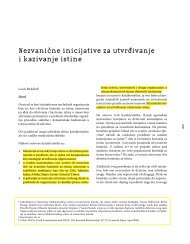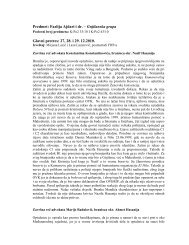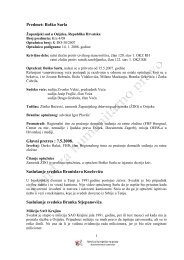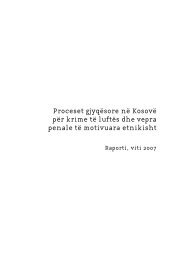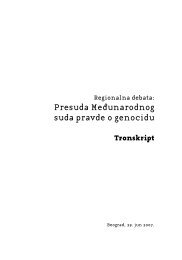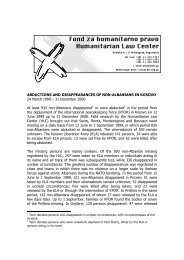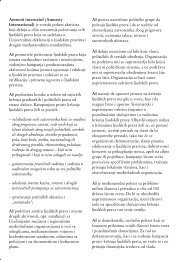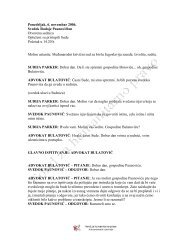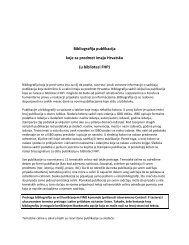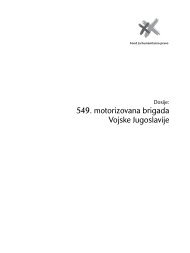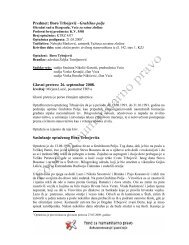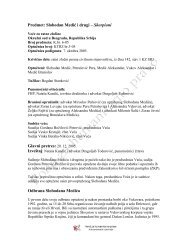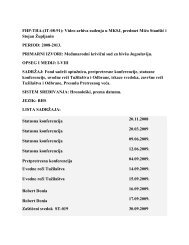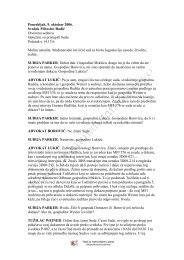here - Humanitarian Law Center/Fond za humanitarno pravo
here - Humanitarian Law Center/Fond za humanitarno pravo
here - Humanitarian Law Center/Fond za humanitarno pravo
Create successful ePaper yourself
Turn your PDF publications into a flip-book with our unique Google optimized e-Paper software.
conclusively determined, he stated that in no case would he exclude the possibility that injuries<br />
inflicted to their soft tissue by a firearm could have caused their death.<br />
Expert witnesses Dr Branko Mandić and Ana Najman, who conducted psychiatric and<br />
psychological examination of protected witnesses ‘Alfa’, ‘Beta’ and ‘Gama’, stated that the<br />
injured parties employed defense mechanisms, such as repression, withdrawal and denial. When<br />
reliving a traumatic experience, they did not add new images but simply recollected past events<br />
and re-experienced the trauma. The protected witnesses` capacity for perception, calling to mind<br />
and retelling what they remembered had been preserved, even after such a long period of time,<br />
and they showed no propensity for false memories or memory disorder.<br />
Analysis of proceedings<br />
The proceedings revealed serious flaws in the work of the Victim and Witness Assistance and<br />
Support Service of the Higher Court. The injured parties had the status of protected witnesses and<br />
testified under code names at main hearings which were closed to the public. These measures<br />
were necessary, but proved insufficient, because the Assistance and Support Service failed to<br />
properly do their work. The Service did not even provide appropriate conditions for the<br />
victims/protected witnesses during their stay in Belgrade. One of the victims, who came to testify<br />
from abroad, w<strong>here</strong> she lived, was provided only with bed and breakfast, without lunch, despite<br />
the fact that her testimony was lengthy and she was going back home immediately upon<br />
testifying. Also, none of the victims/witnesses received adequate assistance to become familiar<br />
with the procedure for testifying. More importantly, none received psychological support. During<br />
their testimony, all three of the injured parties/witnesses were under great stress and their<br />
testimonies had to be interrupted to provide them with medical assistance. They were clearly<br />
confused, unfamiliar with the audio and video equipment and the sequence and manner of<br />
questioning.<br />
These injured parties, as victims of sexual violence, of whom two were underage at the time of<br />
the crimes, are considered especially vulnerable and they were inevitably exposed to secondary<br />
victimi<strong>za</strong>tion while testifying, which affected their testimonies. Bearing in mind the importance<br />
of the testimonies of victims of sexual abuse in war crimes trials, specific mechanisms for the<br />
protection of such witnesses have been developed in practice. International criminal courts have<br />
established procedures in order to adequately cater for the special needs of this category of victim<br />
encompassing special protection measures, special procedures to adduce evidence, provision of<br />
assistance and psychological support by trained experts throughout testimony. Some countries in<br />
the region have adopted these procedures. Despite the fact the <strong>Law</strong> on Organi<strong>za</strong>tion and<br />
Jurisdiction of Government Bodies in the Prosecution of War Crimes provided the legal<br />
23




